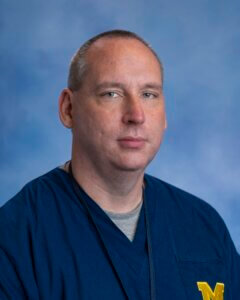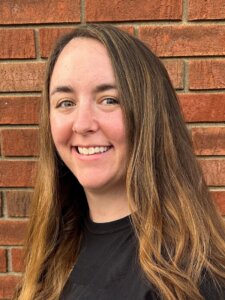

Dr. Nathan Menke, Medical Director of the Inpatient Addiction Medicine Consult Team
Deaths from opioid overdoses increased by 30 percent in Washtenaw County from 2020 to 2021. This parallels national trends, with the Centers for Disease Control and Prevention reporting 15 percent growth for the same period. These devastating statistics compelled University of Michigan Health, part of Michigan Medicine, to step up its efforts to improve care for people suffering from opioid use disorder (OUD). “Once you see these numbers, it validates the need to immediately institute specialized care using evidence-based medicine for these patients,” says Dr. Nathan Menke, Medical Director of the Inpatient Addiction Medicine Consult Team.
“Figuring out the best way to serve this population has been a work in progress for quite a while,” says Emily Smith, Addiction Consult Team (ACT) Social Worker. “Thanks to funding, we were able to get programming off the ground, and we’ve continued to expand exponentially.” Smith referred to a grant Michigan Medicine received from the Community Foundation for Southeast Michigan’s Michigan Opioid Partnership to support establishing a medication for opioid use disorder (MOUD) program.

Emily Smith, Addiction Consult Team (ACT) Social Worker
“The funding is specifically to treat OUD patients coming through the emergency department (ED), but our team supports the inpatient medical units,” Smith explains.
Providing a Comprehensive MOUD Program
ACT began when Michigan Medicine hired Smith in February 2021 to help start the MOUD program. “We did a soft launch with our ED in April and hired a peer recovery coach in May,” she recalls. The team worked with ED physicians to ensure practitioners had a protocol for starting OUD patients on buprenorphine or SuboxoneTM and connecting them to ongoing care upon discharge. An ACT member sees patients if they come in during business hours or follows up the next business day if they come in after hours. “Our goal is to ensure a warm handoff to the next level of care and that these patients don’t just fall through the cracks when they’re coming through the ED,” says Smith.
Due to complications such as cellulitis, endocarditis, or other infections related to injection drug use, the hospital often admits patients who use substances. Michigan Medicine acknowledged the need for a comprehensive approach that integrated ED and inpatient treatment. In June 2021, it rolled out the MOUD program across University of Medicine Health after hiring Dr. Menke. As an addiction specialist, he assists with pain management strategies that do not exacerbate OUD patients’ disease. Arranging warm handoffs is also an essential part of care for this patient group.
“Inpatients come from all over the state and country, and we work hard to ensure that wherever they’re coming from, they get plugged back into care in their local community,” according to Smith.
Michigan Medicine can offer such a comprehensive program because they have a group of professionals bringing the necessary skill set to provide quality care. ACT consists of a peer recovery coach, nurse care manager, pain pharmacist, social workers, and physician. The team has worked to develop strong community partnerships, including with Packard Health, a federally qualified health clinic that offers services for people with OUD.
Overcoming Stigma
Despite Michigan Medicine’s commitment to institutionalize care for OUD sufferers, stigma remains a significant barrier. “Healthcare has historically done a poor job of taking care of people who use substances,” Smith says. “We’re making progress regarding how patients are treated, but many providers don’t think they deserve care.” Dr. Menke says providers’ unwillingness to get MOUD training is another challenge. “They don’t understand substance use disorder and feel very uncomfortable prescribing buprenorphine, so some patients are not getting evidence-based treatment.”
Smith and Dr. Menke agree that education is vital to reducing stigma and making providers more comfortable prescribing MOUD. “We’ve been invited to speak to various departments throughout the system about our work,” says Smith. Residents from family medicine, internal medicine, psychiatry, and other departments spend time learning how to treat patients with OUD. “Our arms are open to anyone who wants to know about this work. We enjoy teaching almost as much as the clinical care,” she exclaims.
Their efforts resulted in greater collaboration and sensitivity among providers treating people with OUD. Patients routinely thank ACT members for effectively managing their withdrawal and pain. They also tell others with the disease and in need of care that the staff at Michigan Medicine is understanding and compassionate.
“Seeing the difference we’ve made for patients is really rewarding. It’s a tribute to how far we’ve come,” says Smith.
Sustaining and Expanding
According to Smith and Dr. Menke, champions and administrative support are the most critical elements for creating a sustainable program. Smith acknowledged a small group of providers familiar with MOUD’s benefits laid a foundation for sustainability by creating buy-in before she and Dr. Menke joined Michigan Medicine. The team built on these efforts by securing a commitment to support vital positions as a step toward sustaining the program. “The MOP grant initially funded Emily. We’ve since convinced leadership to include her role in the operating budget at the hospital,” Dr. Menke says.
Witnessing the impact of ACT’s work has deepened the hospital’s commitment.
“Colleagues and the executive leadership team agree that we’re adding value and have provided additional funding and staff,” according to Dr. Menke.
Michigan Medicine expanded clinical support for ACT by hiring its first-ever peer recovery coach and adding another social worker. The team is considering an addiction medicine fellowship and building support for extended physician coverage, allowing them to serve patients outside regular business hours. “Anyone on my team will tell you I dream of taking over the world and normalizing this care, so I will always advocate for expansion,” Smith effuses. “I hope to make this more readily available for folks.”
If asked to advise other health systems on sustaining their programs in the absence of solid administrative support or champions, Smith would remind them to focus on delivering patient-centered care that inspires change. Positive health outcomes can lead to buy-in and help stabilize MOUD initiatives. “I tell my patients how happy I am to see them. They talk to me about their drug use because they know I want to help them,” she says. “Never underestimate the value of compassion.”
